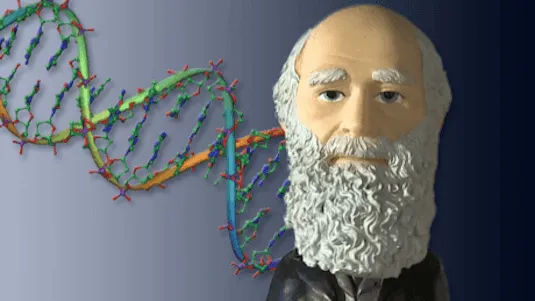
Introduction to Genetics and Evolution 
Duke University is offering Introduction to Genetics and Evolution, a college-level course for new students. This course provides a basic overview of the principles of genetics and evolution, and helps students understand topics such as genome sequences, ancestry, natural selection, and animal behavior. No prior coursework is required. ▼
ADVERTISEMENT
Course Feature
![]() Cost:
Cost:
Free
![]() Provider:
Provider:
Coursera
![]() Certificate:
Certificate:
Paid Certification
![]() Language:
Language:
English
![]() Start Date:
Start Date:
4th Sep, 2023
Course Overview
❗The content presented here is sourced directly from Coursera platform. For comprehensive course details, including enrollment information, simply click on the 'Go to class' link on our website.
Updated in [March 06th, 2023]
Duke University is offering Introduction to Genetics and Evolution to new students. This course provides a basic overview of the principles behind genetics and evolution. Students will learn about genome sequences, commercial kits, debates about the truth of evolution, why animals behave the way they do, and how people found genetic evidence for natural selection. The course will also help students to better understand these issues and prepare them for more advanced coursework in Biology and evolutionary genetics. No prior coursework is required.
[Applications]
Students who have completed Introduction to Genetics and Evolution can apply their knowledge to a variety of fields. They can use their understanding of genetics to better understand the development of diseases, the evolution of species, and the effects of environmental changes on organisms. They can also use their knowledge of evolution to better understand the behavior of animals, the development of new species, and the effects of natural selection. Additionally, they can use their knowledge to better understand the implications of genetic engineering and the ethical implications of genetic testing.
[Career Paths]
1. Genetic Counselor: Genetic counselors are healthcare professionals who specialize in helping individuals and families understand and manage their genetic information. They provide information and support to individuals and families who have, or may be at risk for, a variety of inherited conditions. Genetic counselors are trained to interpret complex genetic information, explain the implications of genetic testing, and provide counseling and support to individuals and families. The demand for genetic counselors is expected to grow as more genetic tests become available and as the population ages.
2. Bioinformatician: Bioinformaticians are scientists who use computer science and mathematics to analyze and interpret biological data. They use their knowledge of genetics, molecular biology, and computer science to develop and apply algorithms and software tools to analyze large datasets. Bioinformaticians are in high demand as the amount of biological data continues to grow exponentially.
3. Evolutionary Biologist: Evolutionary biologists study the process of evolution and the mechanisms that drive it. They use a variety of methods to study the history of life on Earth, the genetic basis of adaptation, and the effects of natural selection on populations. Evolutionary biologists are in high demand as the field of evolutionary biology continues to expand and new discoveries are made.
4. Genetic Engineer: Genetic engineers use biotechnology to modify the genetic makeup of organisms. They use a variety of techniques to modify genes, create new organisms, and develop new products. Genetic engineering is a rapidly growing field with many applications in medicine, agriculture, and industry.
[Education Paths]
1. Bachelor of Science in Genetics: A Bachelor of Science in Genetics is a four-year degree program that provides students with a comprehensive understanding of the principles of genetics, including the structure and function of genes, the mechanisms of inheritance, and the application of genetic principles to the study of human health and disease. Students in this program will also learn about the ethical and legal implications of genetic research, as well as the use of genetic technologies in the diagnosis and treatment of genetic disorders. This degree is becoming increasingly popular as the field of genetics continues to expand and evolve.
2. Master of Science in Evolutionary Biology: A Master of Science in Evolutionary Biology is a two-year degree program that provides students with a comprehensive understanding of the principles of evolutionary biology, including the mechanisms of natural selection, the development of species, and the application of evolutionary principles to the study of human health and disease. Students in this program will also learn about the ethical and legal implications of evolutionary research, as well as the use of evolutionary technologies in the diagnosis and treatment of genetic disorders. This degree is becoming increasingly popular as the field of evolutionary biology continues to expand and evolve.
3. Doctor of Philosophy in Genetics and Evolution: A Doctor of Philosophy in Genetics and Evolution is a four-year degree program that provides students with a comprehensive understanding of the principles of genetics and evolution, including the structure and function of genes, the mechanisms of inheritance, the development of species, and the application of genetic and evolutionary principles to the study of human health and disease. Students in this program will also learn about the ethical and legal implications of genetic and evolutionary research, as well as the use of genetic and evolutionary technologies in the diagnosis and treatment of genetic disorders. This degree is becoming increasingly popular as the fields of genetics and evolutionary biology continue to expand and evolve.
4. Master of Science in Bioinformatics: A Master of Science in Bioinformatics is a two-year degree program that provides students with a comprehensive understanding of the principles of bioinformatics, including the use of computers and software to analyze and interpret biological data. Students in this program will also learn about the ethical and legal implications of bioinformatics research, as well as the use of bioinformatics technologies in the diagnosis and treatment of genetic disorders. This degree is becoming increasingly popular as the field of bioinformatics continues to expand and evolve.
Pros & Cons

Comprehensive content

Interactive slides

Passionate and fun lecturer

Real life examples

Good teacher

Outdated content

Poor instructor support

Difficult quiz questions

Over comprehensive external material

No quiz solutions provided
Course Provider

Provider Coursera's Stats at AZClass
Discussion and Reviews
0.0 (Based on 0 reviews)
Explore Similar Online Courses

Become a Portrait Pro: Family and Kids

Object Oriented Programming in Java

Python for Informatics: Exploring Information

Social Network Analysis

Introduction to Systematic Review and Meta-Analysis

The Analytics Edge

DCO042 - Python For Informatics

Causal Diagrams: Draw Your Assumptions Before Your Conclusions

Whole genome sequencing of bacterial genomes - tools and applications

Biology 102: Basic Genetics

Introduction to Genetics: Certificate Program

Basic Genetics for Teachers: Professional Development
 Related Categories
Related Categories
 Popular Providers
Popular Providers
Quiz
 Submitted Sucessfully
Submitted Sucessfully
1. What is the main purpose of the course Introduction to Genetics and Evolution?
2. What is not assumed in the course Introduction to Genetics and Evolution?
3. What is the goal of the course Introduction to Genetics and Evolution?


Start your review of Introduction to Genetics and Evolution